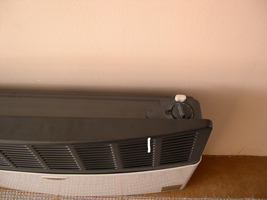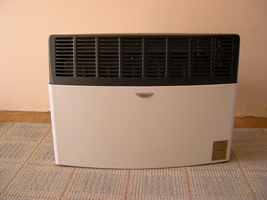Alternative Energy Product Line for Home Heating
1. Global Heating Technologies AG (GHT) is the exclusive owner of approximately 10 patents and patent filings in the areas of flameless catalytic heaters, methanol fuel cartridges, and thermoelectric devices. On this basis,
GHT Inc is producing and has begun marketing heaters in a range of forms and sizes, for various applications. GHT's heaters are unique in being non-electrically self-cold-starting and self-regulating, with designs that can maintain your comfort even during power outages!
The byproducts of GHT heaters are only water vapor and carbon dioxide. Carbon monoxide is never produced. In un-vented space heating models, an oxygen depletion sensor shuts off the supply of fuel if indoor oxygen levels decrease. If desired, the units may instead be vented like conventional heaters, to direct combustion products through wall or ceiling.
2. Silent alcohol-fueled GHT equipment can save money through lower installation cost and reduced ongoing fuel expenditures. As no electrical input is required, GHT units can also be an excellent choice where continuity of heat is desired during electrical power outages. Fuel consumption is approximately 230 cc per kWh (or per 3410 Btu). GHT's heating units are housed in consumer-ready hardware, as shown in the following photograph(s):


Available soon, will be a new GHT model providing some electrical energy from GHT's new thermoelectric technology, also an excellent means of recuperating energy where units are vented to the outside.
3. We also are offering GHT's flameless heater available with the addition of interactive subsystems such as fuel cells--for which GHT heaters are ideally suited for improving efficiency and decreasing startup time--and advanced thermopiles, photocells and absorption cooling. All of these categories are amenable to standalone operation or hybrid configurations also incorporating energy storage devices. In hybridization, they offer synergistic performance and economic advantages in heating, electricity production, and heat driven or absorption cooling processes.
GHT's catalytic heaters and electric fuel cells are kindred technologies utilizing an alcohol or hydrogen fuel supply in common. On price and system longevity, GHT's heater/fuel cell hybrids easily out-compete existing designs in which the heating function is supplied as a byproduct of fuel cell operation.
A standard forecast of longevity for electric fuel cells is in the area of 3000 operating hours, with dehydration of electrolyte identified as a major limitation. GHT's patented re-hydration technology has been successful in a continuously operating demonstration cell, which has logged over 29,000 hours and remains in service.
4. The cost of methanol is comparatively very low compared with petroleum based fuels and ethanol, and it is falling further at the midpoint of 2009 due to an expansion of capacity. Methanol's price is generally decoupled from the cost of petroleum products. It can be produced from biomass, wood thinnings, agricultural and/or municipal waste, rendering it environmentally friendly and/or carbon neutral.
Instead of paying to transport and dump municipal wastes as an economic and ecological liability, processing them to liquid fuels such as methanol presents another strong economic argument for this fuel, and a business opportunity for GHT and its partners.
GHT is in contact with proven experts and intends to build, demonstrate, and ultimately franchise waste-to-fuel systems to provide energy for GHT heat and electricity producing equipment.
Waste regulations in place within EU countries require individuals disposing of household wastes to sort them prior to collection. This provides a cost reduction opportunity to GHT and its waste-to-methanol partners.
Usable byproducts such as agricultural fertilizer also can arise from waste-to-fuel operations, depending upon the type of input waste.
By utilizing fuel from wastes or renewable/"carbon neutral" sources, GHT's equipment can also enables the user to benefit from tax incentives. The magnitude of these advantages is geography-dependent, and the tax codes of each country comprise a matter for study.
5. Carbon Research. GHT has succeeded in early results of its new research program in conversion of CO2 to methanol. Further information is available in regard to this development, with profound implications for carbon recycle and fuel efficiency.
6. Important themes of GHT's business model for interior space heating in Europe:
- Creating eligibility for renewable energy grants from EU and state funds.
- Attracting foreign investment.
- Creating jobs in the manufacture and sale of equipment.
- Creating jobs in the manufacture and sale of liquid fuels.
- Creating jobs in high technology research to maintain GHT and its partners at the leading edge.
- Net gain in carting jobs.
- Tax advantaged fuel production and use.
- High longevity, economical equipment for heating, cooling, and providing electricity for use in habitable spaces.
- Can operate on "carbon neutral," renewable fuels, free from CO, SOx, NOx, and heavy metals emissions.
- GHT equipment designed for alcohol fueling is inherently H2-ready and, with minor retrofit, compatible with implementation of the "hydrogen economy."
- Creating local, regional energy independence in a world-wide environment of declining supplies and price increases for petroleum fuels.





